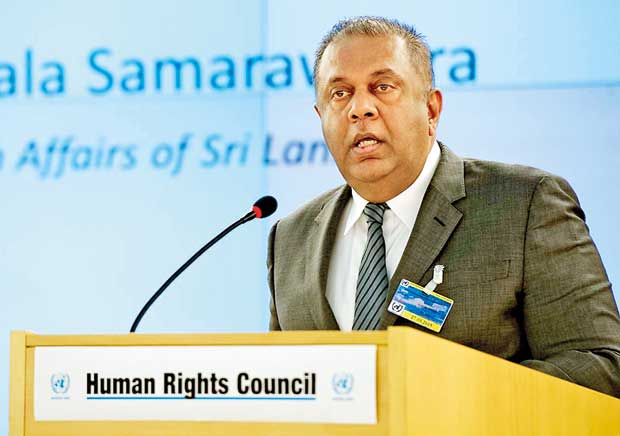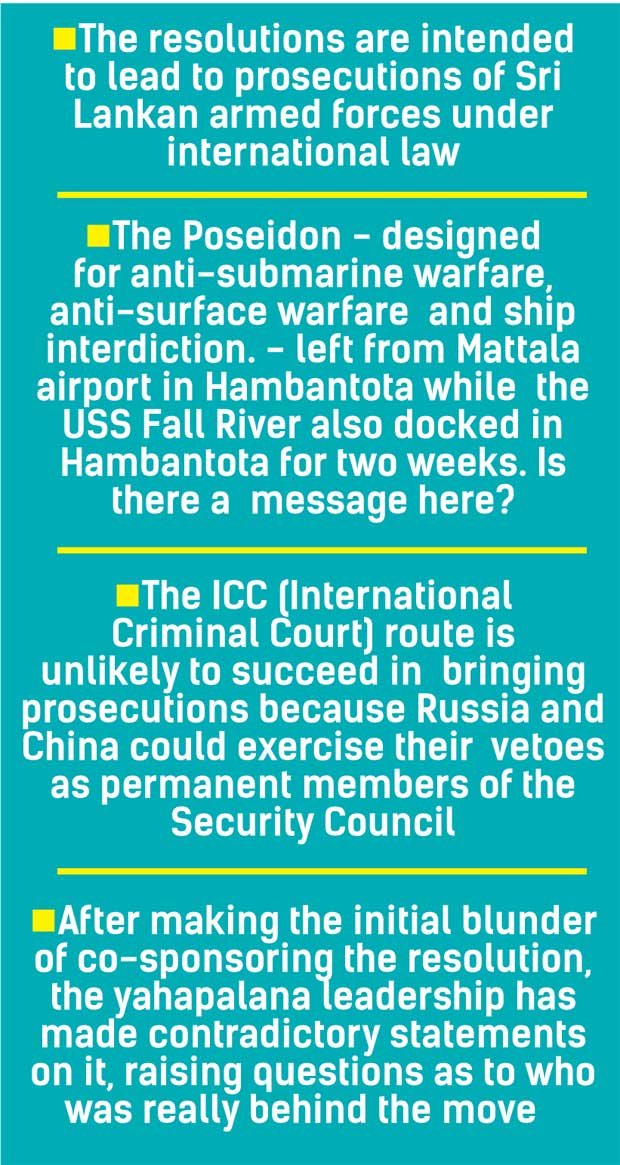Reply To:
Name - Reply Comment
Last Updated : 2024-04-19 22:36:00

After the UN Human Rights Council 34th session ended in Geneva, the US said it introduced three resolutions that were adopted with ‘broad cross regional support.’ The list included Resolution 34/1 on Sri Lanka.
The statement says that ‘Sri Lanka was one of the 47 co-sponsors’ of Resolution 34/1. This assertion is extremely disingenuous, if it is made on the basis that the resolution was adopted without a vote in the 47-member HRC. How could any member state of the HRC or friend of Sri Lanka be expected to raise its voice against the resolution when Sri Lanka itself had submitted to co-sponsoring it?
Interestingly the other two resolutions led by the US at the 34th session, on South Sudan and North Korea, relate to HRC mandated exercises to collect evidence that can be used in  future ‘accountability mechanisms.’ The Commission on South Sudan is chaired by Yasmin Sooka who was one of the panelists on Ban Ki Moon’s infamous ‘Advisory Panel’ on Sri Lanka. While there is no comparison between the very different situations of Sri Lanka and those of South Sudan or North Korea, this should give us a clue as to what the HRC resolutions 30/1 and 34/1 are really about.
future ‘accountability mechanisms.’ The Commission on South Sudan is chaired by Yasmin Sooka who was one of the panelists on Ban Ki Moon’s infamous ‘Advisory Panel’ on Sri Lanka. While there is no comparison between the very different situations of Sri Lanka and those of South Sudan or North Korea, this should give us a clue as to what the HRC resolutions 30/1 and 34/1 are really about.
It would suggest that the resolutions are intended to lead to prosecutions of Sri Lankan armed forces under international law. The security forces are directly targeted in the resolution and although parties pushing for its implementation like to say that the issue of ‘foreign judges’ is getting undue attention, it may be seen that insistence on international participation in a retributive (as opposed to restorative) process, with a special prosecutor’s office etc, is a consistent thread in the resolutions and the reports coming out of the Office of the High Commissioner for Human Rights.
Security forces in their submissions to the Consultative Task Force on Reconciliation Mechanisms (CTF report) have expressed unequivocal support for the government’s reconciliation initiative, and for a restorative as opposed to retributive approach. In spite of hearing sharply divided opinions from Tamils in the North and East, and Sinhalese in the South, the CTF ends up recommending a hybrid court with full participation of foreign judges, defence lawyers, prosecutors and investigators, saying that this recommendation is made in line with the 2015 Geneva resolution. The High Commissioner for Human Rights in turn, refers to the CTF’s recommendations to justify his reiteration of the need for international participation. So this has become a somewhat circular argument. While many governments representing the Western bloc spoke in support of the CTF’s recommendations during the Interactive Dialogue on Sri Lanka, it’s worth noting that the CTF’s Secretary heads an NGO funded by those very same governments. The question as to why there is an insistence on prosecutions, and from where that pressure originates, needs to be answered if we are to believe that the goal of reconciliation is being pursued in good faith.

As the High Commissioner for Human Rights himself has admitted, the ICC (International Criminal Court) route is unlikely to succeed in bringing prosecutions because Russia and China could exercise their vetoes as permanent members of the Security Council. During his visit to Sri Lanka last year he also admitted to the difficulty in trying to have a Bill passed in the Sri Lankan parliament for this purpose. So those pursuing this resolution know that the only way it could be done is to get Sri Lanka itself to set up a judicial mechanism of its own accord, with foreign participation to try Sri Lankan security forces under international law, amending the constitution and enacting legislation with retrospective effect to enable the process. This is a tall order, seeing that Sri Lankan soldiers were fighting legally, on the orders of their political leaders, on their own territory, to defeat a separatist terrorist enemy, and achieved their objective. In the absence of other tools, is ‘human rights’ being used as a political weapon? This approach in dealing with weaker states with strategic importance to the US would perhaps explain the superpower’s more active involvement in the HRC in recent times.
After making the initial blunder of co-sponsoring the resolution, the yahapalana leadership has made contradictory statements on it, raising questions as to who was really behind the move.
President Sirisena who is Commander-in-Chief of the Armed Forces has categorically said he will not allow prosecutions of armed forces over alleged violations of human rights during the war. He has vehemently rejected the rights chief’s proposal to have foreign judges.
Prime Minister Ranil Wickremesinghe has publicly acknowledged not only that having foreign judges in a hybrid court was impossible under the present constitution, but that a constitutional amendment to make way for it was not acceptable either. Adressing Buddhist monks at a religious ceremony in Weeraketiya last month he said “Our judges have taken oaths (prathignawa) in this country, foreign judges have not. Therefore it there is no provision for it. If the constitution is amended what happens? There would have to be a referendum. Then what would happen is that we will lose the referendum like David Cameron. If we take the constitutional route we will lose in a referendum. So we have said this cannot be done either.” Wickremesinghe went on to say that if any in the tri-forces have broken the law, action could be taken under the tri-forces law or national law, and stressed that the need of the hour was to reach a settlement (rata samathayakata path kireemai). So the prime minister has realized the futility of expecting reconciliation to come about through this path. He reiterated these points in parliament.
The other recommendation that the prime minister told the monks he would not agree to is for Sri Lanka to ratify the Rome Statute of the ICC. He said he was always opposed to it, that former US president George Bush had advised him against it in 2003, and that all of South Asia opposed it. The call for Sri Lanka to accede to the Rome Statute of the ICC was a recommendation made by rights chief Zeid in his report on Sri Lanka.
The US under George Bush fiercely opposed ratification of the Rome Statute on the grounds that it would be used against Americans for political reasons. It argued that the court did not have the power to try US citizens for crimes committed in US territory, and that it was inconsistent with US constitutional protections. It even enacted a law that authorized the president to use military force to free US personnel held by the court! The US wants others to do as it says, but not as it does, it appears.
Foreign Minister Mangala Samaraweera, in the light of glaring inconsistency between his stance and that of the President and Prime Minister seems to have finally realized that he cannot clap with one hand. Having repeatedly assured western audiences of Sri Lanka’s commitment to fully implement the resolution, Samaraweera has had to engage in considerable verbal gymnastics to save face with his western patrons. He now admits that the government can’t bring foreign judges under the present constitution. But he stops short of saying the government will not do so. Asked by a journalist whether there would be changes in the new constitution that would allow for foreign judges, Samaraweera evaded the question saying that ‘foreign judges are not our sole obsession.’
This brings us to the unanswered question of where the pressure for a process targeting Sri Lanka’s security forces comes from. It is known that the main architects of the resolution are the US and the UK. While they are backed by others in the western bloc, this time Japan has added its name among six new co-sponsors - the only country in the Asian group to do so. This is possibly an outcome of Japan’s closer alignment with the US in the international arena recent times.
The changing geopolitics of the Indian Ocean Region is a factor that cannot be ignored in discussing the behaviour of international actors in relation to Sri Lanka. It’s no secret that the island’s strategic location has made it a pivot-point in an ongoing contest between the US and China for regional dominance, especially in the maritime sphere. China has been playing hard ball in relation to its infrastructure investments, particularly Hambantota port, while the US has made a series of ship visits to ports of Colombo, Trincomalee and Hambantota, under the rubric of a ‘strategic partnership.’ Within a space of 12 months no less than seven ships and the Boeing P8-A Poseidon aircraft of the US Navy visited. These are the most sophisticated war machines of the world’s superpower. Five of the ships are designed for amphibious operations while the other two are for anti-submarine warfare and submarine-tending. The Poseidon - designed for anti-submarine warfare, anti-surface warfare and ship interdiction. - left from Mattala airport in Hambantota while the USS Fall River also docked in Hambantota for two weeks. Is there a message here?
The US wants to develop relations with Sri Lankan armed forces, but as an obedient, docile partner, not as a proud, victorious army that defeated the most ruthless terrorist organisation in the world. Could this perhaps explain why the US is gunning for the generals in Geneva, using human rights as the weapon? Is the saga of HRC resolutions against Sri Lanka, in the end, not about reconciliation at all, but about retribution?

Add comment
Comments will be edited (grammar, spelling and slang) and authorized at the discretion of Daily Mirror online. The website also has the right not to publish selected comments.
Reply To:
Name - Reply Comment
On March 26, a couple arriving from Thailand was arrested with 88 live animal
According to villagers from Naula-Moragolla out of 105 families 80 can afford
Is the situation in Sri Lanka so grim that locals harbour hope that they coul
A recent post on social media revealed that three purple-faced langurs near t